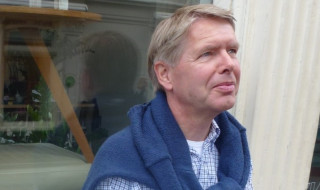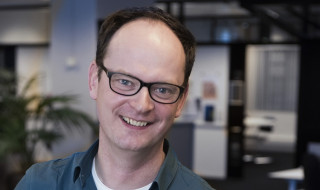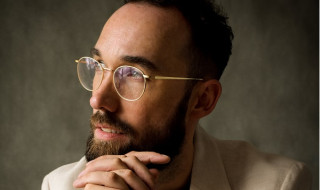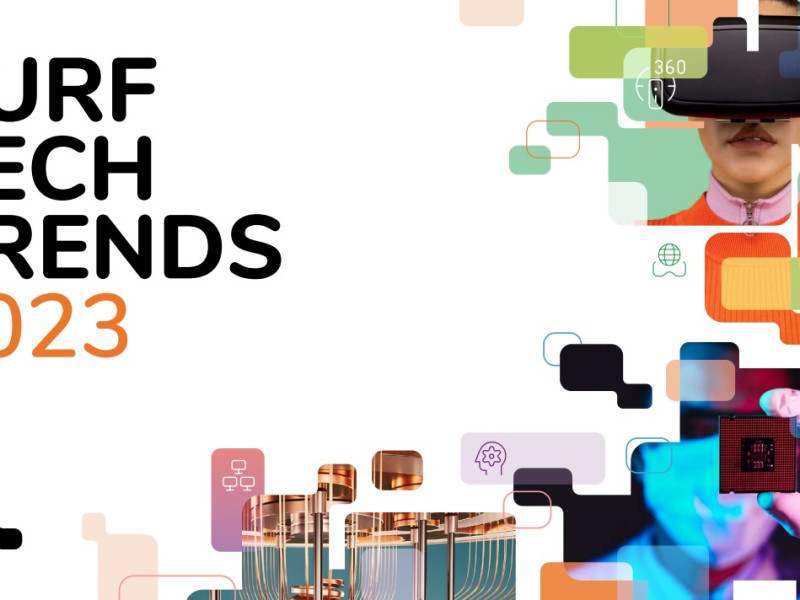Imagining the future with SURF Tech Trends 2023
With 6 technologies and 29 trends, SURF Tech Trends is an inspiring report for everyone working in education and research. But it only really comes to life when we, the education and research sector together, shape the developments and applications. Three experts tell how they view this. "The trend report encourages us to anticipate, to look ahead.
Although the trends are described individually in the report, things get really interesting when we combine the technologies. A university in the metaverse? For that, you need a stable network, sensors, AI, you name it.
"At the University of Twente, digitisation has become an important part of the strategy," says Jan-Laurens Lasonder Director LISA (Library IT services & Archive). He is one of the experts from the institutions that contributed to the trend report.

Jan-Laurens Lasonder, University of Twente
The SURF trend report helps to start the dialogue. This is also what Lasonder envisages for the report. "A trend report opens the shutters to what is happening in the outside world. Then you sometimes see situations you can hardly imagine, but which suddenly turn out to be reality. For example, when a top professor decides to start his own business and offers his lectures online as well as paid. Or big tech who set up their own academies in the US and offer them at much lower cost. We think we have a protected business model, but technology can change that very quickly. That's what we need to talk to each other about."
Social context
With all the technology we now have at our disposal, much can be done. "Even so much, that we increasingly have to ask ourselves 'Do we actually want what we can do?'," says Rudy van Belkom, director of the Technology Futures Foundation in his presentation at the launch of the trend report on 15 February 2023. "For a long time, the question was 'can we do what we want?' Is technology the solution to our problems? But with what is now possible through technology, we need to turn that question around."
Increasingly, we need to ask ourselves 'Do we actually want what we can do?'
This is also the opinion of Martijn Kleppe, board member at the KB, nationale bibliotheek, and member of the Scientific Technical Council (WTR). For his taste, the trend report could have gone deeper into the social context. "That is a nice next step in the further development of the trends," he says, "socially and interpersonally there is still so much to think about. We are video calling now, which is convenient for this interview because we don't have to travel, but it also means we don't meet."

Martijn Kleppe, KB
"See, there's the public and digital public space, and digital public space we are reclaiming. You see initiatives emerging that stem from the desire 'if I engage on the internet, I don't want to be constantly monitored.' This has to do with our identity formation and need for security. There is always an awareness around the consequences of technological developments." Kleppe sees this awareness as a social moss ground under all these tech trends.
Building more yourself
Like Kleppe, Lasonder endorses the broader picture in which technological breakthroughs are emerging. For instance, he places the trend of low-code development in a social context in which there is a focus on digital sovereignty and we want to be less dependent on tech providers. "It is moving towards us building more and more applications ourselves," Lasonder says. "We tend to buy standard applications together, but the cost of software licences is skyrocketing. That is something we need to pay attention to. Low-code platforms facilitate an environment where you can build new applications together very quickly, and in interaction with users. It's enormously cool to see the enthusiasm that generates. This way, we get more capability ourselves." He can imagine that we will soon be exchanging applications with each other, without having to settle, as each contributes to a shared 'app store' for education and research.
For me, eXtended Reality fits into the search for new ways to provide access to information.
Kleppe sees the potential of eXtended Reality (XR) for his daily practice. Although within the WTR, opinions on this technology are divided. "There are those who say it is a hype, with comparisons between the metaverse and second life. I am from the other school. For me, eXtended Reality fits into the search for new ways to provide access to information."
"The KB has a huge warehouse of medieval books, among other things. You and I are not allowed to go in there as we are not trained to handle them. You can request to see them, but you never see them all on the bookshelves in the warehouse. And it's an eternal shame that you can't access them. There are treasures that monks have spent years working on. Can't we offer that experience in other ways? For example, by walking through such a warehouse with VR glasses, without actually being there."

Looking ahead
"Trends have an exploratory value," says Van Belkom. "It is not about the question 'So? Have the trends come true?' The one future does not exist, nor is there a dominant picture of the future. Instead, multiple future scenarios are possible and it's about being able to imagine them. That's called future consiousness, a skill you can train."
And we need to do that together. Kleppe: "We must avoid leaving innovation to just one department later on: like there in room 3.22, that's where the innovation takes place. We need to tackle this together and build a culture of learning and sharing. As members of SURF, we are constantly working on this. And SURF is the platform that gives a pendulum to this and shares it further."
"What I personally am very much in favour of is looking further ahead," says Lasonder. "We are in the frenzy of the day. Are we going to tender for a student information system or not, who will participate and who will not? But the discussion should also be about what kind of student information system will we have in five years? What will that look like? Should we tender or is building it together an option, and then make it open source? If you have discussions like this more often, then you come up with future scenarios and know better what decisions you can make in the short term."
If you have discussions like this more often, you will come up with future scenarios and know better what decisions to take on short term.
Take the example of the self-driving car that Van Belkom presents to us. "The idea of the self-driving car dates back to the 1950s and has remained unchanged since then; a car you don't have to drive. The elaboration, however, is completely different due to a completely changed social context in 70 years. The narrow focus on the changing social context is also known as the cultural blind spot. In 1950, in the visualisation of this car, the front and back seats had been replaced by a cosy round seat where you played board games with each other, for quality time with the family, the cornerstone of society. Today, the self-driving car has become an office on wheels and focused on time-saving and efficient. In short, the same idea, elaborated according to very different values in two completely different concepts.
The dialogue
For the trends to land within all layers of an institution, you need to have a dialogue. Lasonder: "These are the trends identified by SURF, how do we as institutions view them? What do we consider important and what is less important. Are the innovation agendas still correct or do we need to adjust them?" A trend report is not a blueprint, it is flexible. And it has to be, because the world is constantly changing.
How to move forward? That is where the three experts agree. The trend report only comes to life when you start working with it. By placing the trends in their social context. In sessions, by sharing experiences, by imagining the future together.
Can you imagine the future?
Text: Maureen van Althuis
Download SURF Tech Trends 2023
'Toekomst voorstellen met SURF Tech Trends 2023' is een artikel van SURF Magazine.
Terug naar SURF Magazine
Vragen naar aanleiding van dit artikel? Mail naar magazine@surf.nl.
